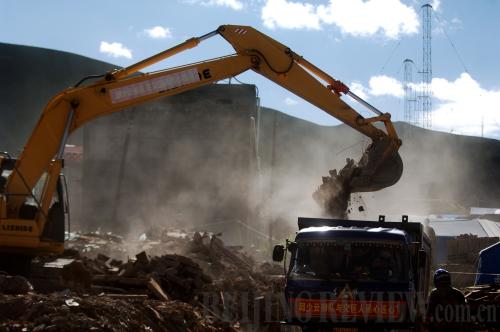|
 |
|
REMOVING RUINS: An excavator loads rubble onto a truck in a village of Gyegu Town on July 9 (ZHANG HONGXIANG) |
After a 7.1-magnitude earthquake struck Yushu County, Yushu Tibetan Autonomous Prefecture of northwest China's Qinghai Province, on April 14, the whole Chinese society has helped with disaster relief and post-quake reconstruction. In late May, the State Council, China's cabinet, issued guiding opinions on post-quake reconstruction in Yushu. Recently, Fei Zhirong, Deputy Director of the Department of Western Regional Development under the National Development and Reform Commission (NDRC), briefed netizens at the official website of the Central Government, www.gov.cn, on the progress of post-quake reconstruction in Yushu. Edited excerpts follow:
The earthquake-stricken region in Yushu has the following characteristics: It is located at the source of China's three major rivers—the Yangtze River, the Yellow River and the Lancang River, and situated at the conjoined area between Tibet Autonomous Region, Qinghai and Sichuan provinces. Historically, it was an important trade center. It is also a multi-ethnic region. More than 97 percent of locals are minorities, and 93 percent are Tibetans. Yushu has colorful ethnic cultures. The area also has many religious followers, and religion has a wide influence on people's lives.
Some extraordinary difficulties lie in Yushu's post-quake reconstruction. First, a lack of oxygen on the plateau makes reconstruction work much harder. Second, the time suitable for architectural construction is short, with only five months in a year suitable for such undertakings. Third, few building materials are produced locally because of efforts to conserve biological habitats, so they have to be brought in from other places. Fourth, transportation is inconvenient. Fifth, there are insufficient local design engineers or construction workers to carry out the reconstruction. Outside support is needed. Sixth, the local economy is underdeveloped.
In light of Yushu's unique characteristics and special difficulties, the Central Government emphasizes special policies and measures should be taken to support the post-quake reconstruction. The reconstruction will be primarily supported through fiscal transfers from the Central Government and partner assistance programs.
On June 9, the State Council issued an overall plan on Yushu's post-quake reconstruction. The plan has comprehensively analyzed the basic situation in quake-stricken regions in Yushu, including favorable and unfavorable local conditions.
The plan has highlighted four points. First, people's livelihoods, such as the reconstruction of urban and rural residences. Education and public health facilities are also to be prioritized. Second, the ecological system in the disaster-stricken area is fragile, yet important. Special efforts should be made to protect the biological environment, especially in the source of China's three major rivers. Third, reconstruction of Gyegu Town is very important, since the town is the seat of Yushu's prefecture and county-level governments, and is one of the worst hit regions. Fourth, a beautiful home for all ethnic groups must be built.
The reconstruction will be carried out in three years. This year's priority is on projects related to people's livelihoods, especially building urban and rural residences. In the meantime, construction of schools and hospitals shall start. Before this winter many people, especially herdsmen, will be moved into permanent houses, because winter is especially cold in Yushu. Other reconstruction projects will start as long as preparation is ready and the situation permits.
|
